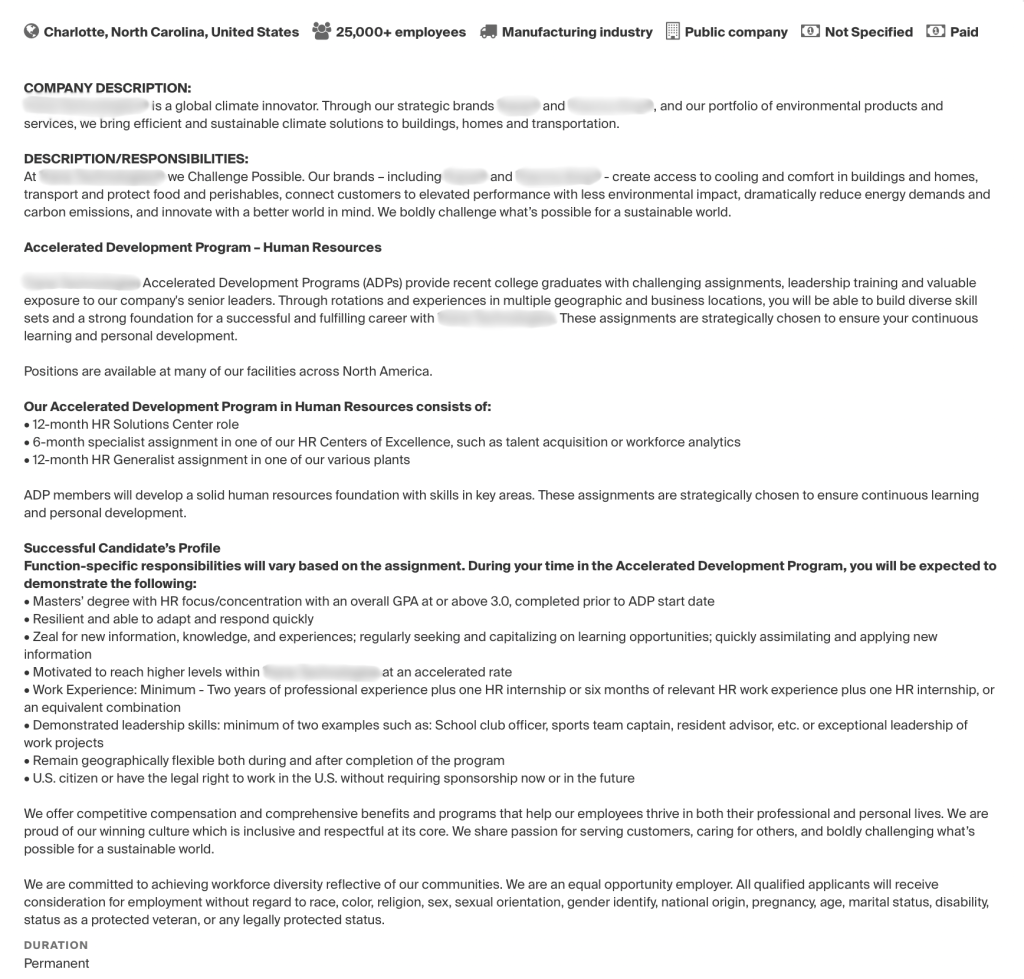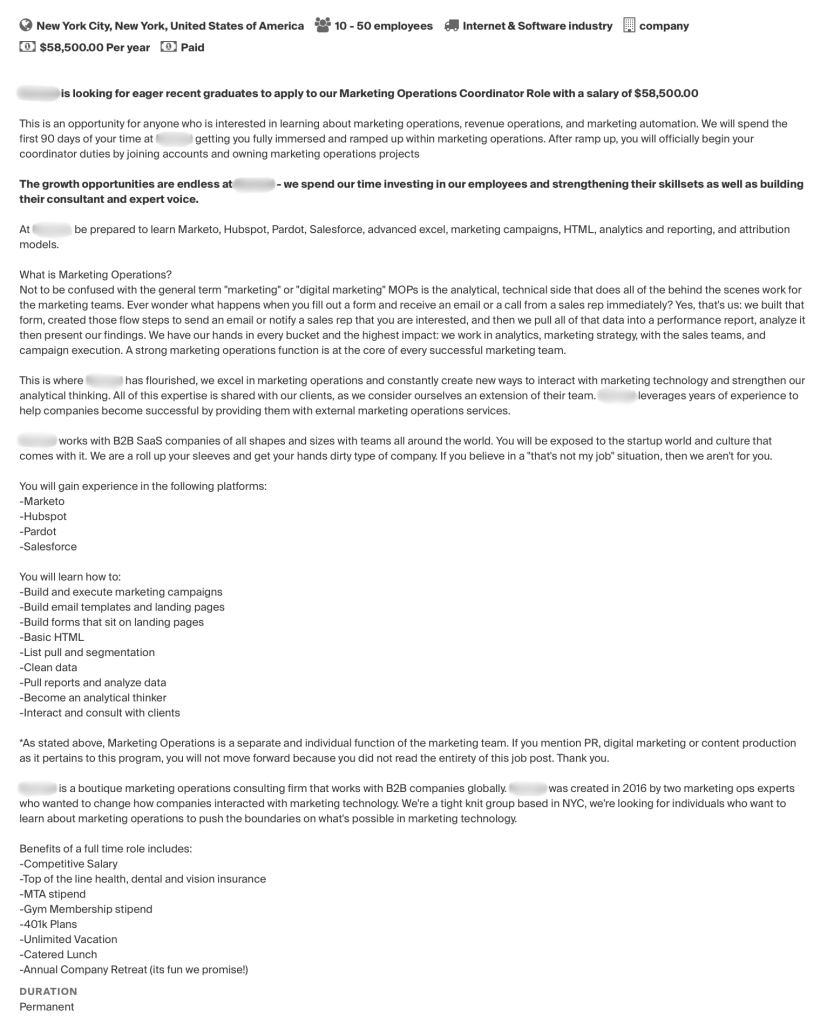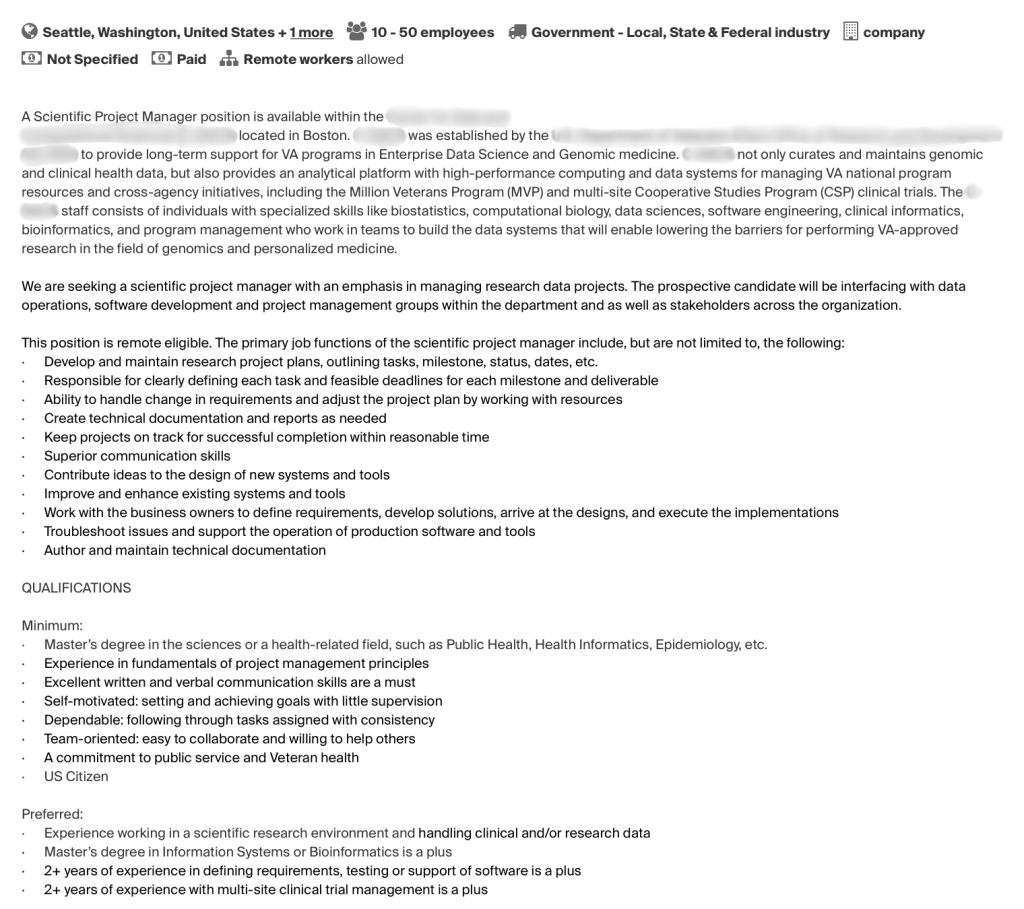
With the rise of a new recruiting season, we wanted to look into what attracts someone to a job description/listing. More specifically, we wanted these answers to be from Hopkins students to truly get to the bottom of “What do Hopkins students look for when applying for a job?”
To achieve our aim of understanding the mind of a Hopkins job applicant, we gathered three (3) job listings and three (3) upperclassmen. We asked the upperclassmen to give their initial thoughts on why they would (a pro) and why they wouldn’t (a con) apply for each of the 3 jobs based on their job descriptions. For confidentiality purposes, we won’t share the company names but will provide a brief snapshot of the listing alongside the students’ opinions.
Job Descriptions and Student Responses:
Job Description 1:

Indira Summerville, Public Health, Johns Hopkins University 2023:
“PRO: With the rotational aspect of the program, this opportunity allows for a chance to explore multiple positions in various states and possibly even countries. As someone who is eager to travel after graduation, this job would be great so that I could get a good idea of the type of career I would want to have before jumping into the job force.
CON: Besides the fact that this company does not work in an area of which I have interest or experience, there isn’t much concrete information about the various plants/locations or the ballpark salary. I wouldn’t want to be blind sighted by low compensation or plants in a location in which I have no interest.“
Jayla Scott, International Studies, Johns Hopkins University 2023:
“PRO: As a soon to be graduate, the job description including that it’s geared towards “recent college graduates” makes me more comfortable with applying with minimal experience in the company’s area of work. It also is clear that the job and company’s aim is to bolster my skills in a wide array of areas.
CON: They don’t clearly state what your responsibilities would be as an employee.“
Michelle Mokaya, Chemical and Biomolecular Engineering, Johns Hopkins University 2023:
“PRO: Company seems to really emphasize a culture of sustainable practices which aligns with some of my work interests. I really find myself gravitating to rotation programs post-graduation because of the diversity in roles and exposure to different functions in a company.
CON: The program is in HR and requires a masters in that specialty. Besides the fact that I don’t have the educational requirements, I don’t really see myself working in a human resources role, especially as my first entry-level job.“
Job Description 2:

Indira Summerville, Neuroscience and Public Health, Johns Hopkins University 2023:
“PRO: The available information on the skills that will be obtained, as well as included benefits are quite interesting, and would make me more inclined to move forward with an application.
CON: There is a section toward the end saying they are “a tight knit group.” While I think that is generally appealing when looking for a smaller company, I would personally be averse to it. Mostly because I may end up feeling intrusive or that I have a lot of catching up to do in order to fulfill this role on both a professional way and in interpersonal ways.“
Jayla Scott, International Studies, Johns Hopkins University 2023:
“PRO: The 90-day training period listed in the description provides me with the comfort that even if I didn’t have experience in marketing operations, I would be able to effectively do this job after the training period.
CON: The statement “if you believe in a ‘that’s not my job situation, then we aren’t for you” is off putting and sounds like they don’t respect personal and work place boundaries.“
Michelle Mokaya, Chemical and Biomolecular Engineering, Johns Hopkins University 2023:
“PRO: This job seems to offer a lot of experience when it comes to the more technical side of Marketing and sales.
CON: The job requires a lot for what they say is a competitive salary, but a little under 60k in New York City, this is not a sufficient compensation. They throw in things like MTA stipend or unlimited vacation, but the job seems like it will go beyond the regular 9-5 schedule.“
Job Description 3:

Indira Summerville, Neuroscience and Public Health, Johns Hopkins University 2023:
“PRO: This opportunity offers a remote work option, which is appealing for me and others who wouldn’t want/have the means to relocate to Boston.
CON: There is no information on the approximate salary. Additionally, one of the minimum requirements is a Master’s Degree, something I do not have yet. Therefore, I would not, as well as any other Hopkins undergraduate student, be able to apply to this job immediately post-graduation.“
Jayla Scott, International Studies, Johns Hopkins University 2023:
“PRO: Remote workers allowed!
CON: Having to apply by sending resume and cover letter to an outside email; this feels less organized/structured and more likely for your application to get lost in a sea of e-mails.“
Michelle Mokaya, Chemical and Biomolecular Engineering, Johns Hopkins University 2023:
“PRO: Scientific project manager seems like it has the right level of technical knowledge as well as management/leadership development. As a new grad, it would be exciting to utilize STEM degree that doesn’t always require me be hyper focused on the science and engineering aspect of things. I also love that the job is remote, giving me the flexibility to live where ever I would like.
CON: The qualifications require a masters in a health or sciences related field, but I think any individual with an interest/background in these specialized skills and a bachelor’s degree could probably execute the tasks of this job well.“
In Conclusion…
Generally, the students we reached out to tend to most appreciate a workplace with location flexibility (remote work options) and salary transparency, as well as one that aligns with their professional goals/interests, promotes a healthy interpersonal workplace environment, and has realistic expectations of prior experience. With the current Johns Hopkins upperclassmen classifying as Generation Z (Gen Z), these responses come as little surprise.
Why?
“5 Tips to Attract and Retain Gen Z Talent” by Madison Vitug at LinkedIn highlights that, statistically, flexibility, prioritization of learning and growth, and prior-experience realism (avoiding experience inflation) are required to successfully recruit Gen Z talent. Whether it’s recruiting Hopkins Talent specifically, or youthful talent generally, it’s important to pay attention to the changes that have occurred between today’s generation compared to the previous, and ensure both your hiring and recruiting processes reflect the wants and needs of those you’re catering to.
We can generalize the wants of GenZ to 4 key pillars: flexibility, growth, balance, and realism. Ensuring that your company prioritizes these pillars and reflects them in the job description is the first step to increasing your chances of garnering more Gen Z and Hopkins talent alike.

